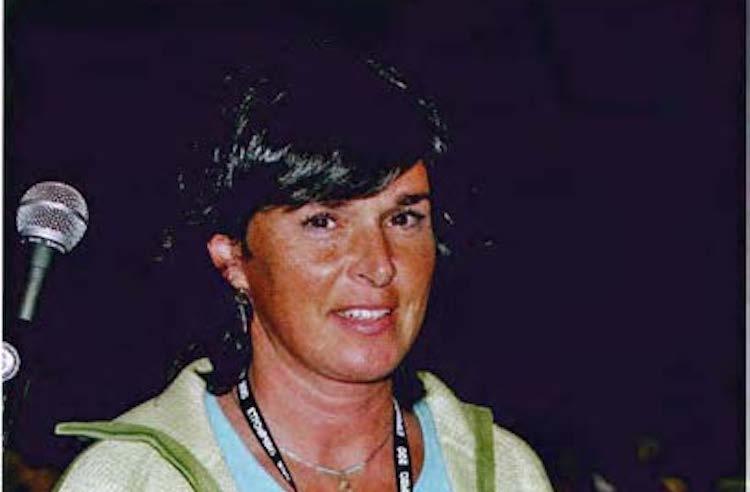
Profile: Deb St. Amant - Stepping Forward to Promote Equity
Deb St. Amant holds the distinction of being the first equity chairperson for the Kawartha Pine Ridge local. When they formed the committee earlier this year, the other members and local president Mark Fallis thought that with her experience in equity issues she would be the most suitable chair.
Deb was born in Penetanguishene. When she was 11 her family moved to France, then later to England where her father managed the first European refrigerated factory for food. The family travelled extensively throughout Europe. Five years later they returned to Canada where Deb completed grade 13.
The St. Amant family is very close, so much so that when Deb began undergraduate studies at the University of Western Ontario she did not move to London alone. “Not everybody’s family moves off to university with them,” she notes. Now, she and her two teenage boys live three houses away from her parents. When Deb’s work takes her away from home, her boys are under the watchful care of their grandparents whose own experiences were more difficult than Deb’s have been.
“My mom used to hate being called “squaw” and tried to hide the fact that she was Aboriginal. I’ve never experienced that in Canada. No one has ever called me names. When I was in Australia, some people there were excited to meet an Aboriginal Canadian and others called me Boong...a derogatory name for Aborigines. People everywhere are afraid of anybody the least bit different.”
The oldest of four children, Deb says she was a teacher from the day she was born. She graduated from Queen’s University Faculty of Education in 1982 and has taught core French to grades 1 through 9 and extended French to grades 5 to 8.She is a certified level 3 soccer coach.
She is also a self-taught artist. A copy of one of her paintings, Mother and Child, was included in the kits given to conference delegates at the 2004 Trent University conference, Repositioning Native Women in Canadian History: Enhancing Curriculum, a conference she helped plan.
Deb did not become actively involved in ETFO until 2001 when she took part in a focus group about Aboriginal members. Until then she had paid little attention to the federation as she considered it to be the domain of politicians - those with the power and the access to influence decisions and policy. She believed that as a simple elementary teacher, she was far removed from that milieu.
This false perception of ETFO as an entity distant and separate from the individual teacher is widely shared amongst members, Deb believes, and is important to change so that new and diverse voices feel encouraged to become involved. She says that in fact ETFO makes it easy for any member to do what she is doing.
Deb is now member of the Aboriginal education committee. Last spring, she successfully co-ordinated a race relations retreat involving members from the Kawartha-Pine Ridge, Durham, and Peel locals. She is proud that a young Iqaluit man who was the fire-keeper at the race relations retreat told her he had decided to become a teacher because he was inspired by the experience of being among such a dynamic group of teachers.
Deb is a presenter at ETFO teaching circle and equity workshops. This summer the Canadian Labour Congress invited Deb to be a presenter at its equity workshop. She has also been working for the Toronto District School Board and the Ministry of Education as a member of the team writing the social studies curriculum, which includes Aboriginal education.
A shy person by nature, it was her involvement in ETFO activities that helped her discover the confidence to speak and present her ideas publicly, Deb says. At the 2005 Annual Meeting she spoke to motions and responded to issues that in her opinion affect every ETFO member. She believes it is impossible to stand up for Aboriginal rights and not stand up for the rights of other marginalized groups. “The refusal to recognize one group of people creates the conditions for the same treatment of others. Aboriginal teachers need to understand the importance of all aspects of equity education.”
She was disappointed that resolution 5 - which would have given designated seats on the executive to minority group members - did not pass. “Many Aboriginal, racial minority, LGBT, and members with a disability will not run for executive .. .the majority of voting members are not within these groups. That’s why they need to have designated seats. We all want to see ourselves reflected in our executive.”
“This is the third time this resolution has been tabled. Each time the vote is closer. Maybe next time delegations will have more equity-minded individuals who will vote in favour of designated seats. Maybe the locals will encourage people from these four groups to be a part of their delegations.
“Maybe I dream in colour...but at the next Annual Meeting Til be asking the candidates to define equity and to tell me what they have done on a personal level to promote it.”
Janice Rogers is an ETFO staff member and freelance writer. This is the second in a series highlighting ETFO leaders.

